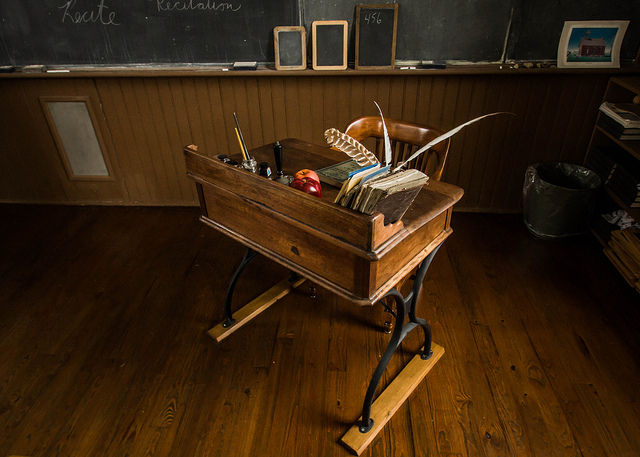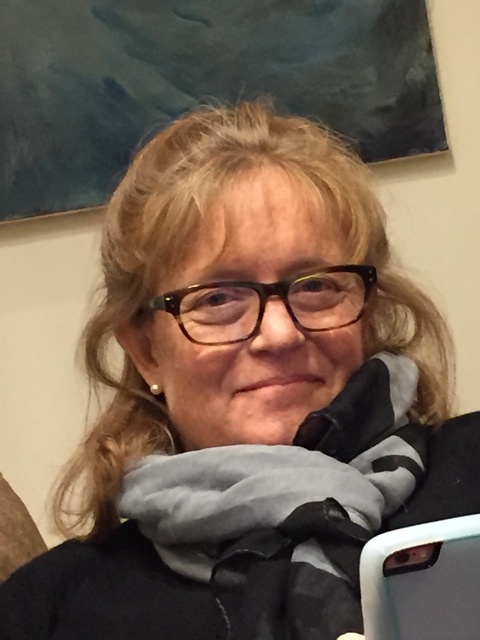Theme Essay by Morgan Baker
On Doing Real Work in Both Professions

On the first day I taught, more than thirty years ago, I walked to class so slowly from the South End to the Back Bay of Boston that it felt as if I were moving in reverse. I was terrified. I’d always been the student in the back of the classroom, the one who looked down at her desk when the teacher asked a question. Even if I knew the answer, I was so afraid of being wrong and looking like a fool, I kept my mouth shut. This feeling lasted all the way through college and even graduate school.
When my graduate school mentor suggested I try teaching, I laughed. Me? I didn’t think I had it in me, but I figured the only way to find out was to face my fears and stand up in front of a classroom and see what happened.
It was pretty bad. I talked in a monotone. I hardly looked anyone in the eye, keeping mine glued to the back of the room. The semester dragged by, but at the end of it, one student stepped up to my desk and said, “You know, you did get better.”
And I was hooked.
I’ve been teaching writing—feature writing and creative nonfiction—and doing my own writing ever since, although finding the balance between the two isn’t always easy. Last summer, another professor in the department where I teach asked if I considered myself a teacher who wrote or a writer who taught.
My answer changes daily, weekly, by the semester, and by the year. When I introduce myself to strangers at parties, I often say I’m a teacher first and a writer second. Being a teacher is something others can latch on to and understand. They nod their heads approvingly and ask where I work. How long have I been there? Do I enjoy it? Then, as an aside, they often ask if I do my own writing, as if it’s a hobby I might partake in when I have time. They sometimes say they’re thinking of trying their hand at it after they retire from their real jobs as doctors, lawyers, or business associates. And: Would they have heard of me?
Most likely, my name won’t mean anything to them. Even though I have been published in both obscure and well-known publications, readers don’t read bylines by feature writers, and my creative nonfiction is in mostly small journals. But my writing is not a hobby. My hobby is pottery. My real work is writing—and teaching.
I spend a lot of energy on my students’ work, helping them to write tighter sentences, to come up with topics and sources for feature stories, to find the real focus of their essays. I’ve certainly thought about all the time and energy I’d have for my own work if I didn’t have to teach to pay the bills. But the truth is, I’d miss it.
I don’t teach because I have to. I teach because I love it. I wouldn’t have stayed with something this long just to make a buck. If the world were a perfect place and someone dumped a backhoe full of cash in my lap and said I didn’t have to work anymore, I’d still write—and I’d rework my syllabus and come in to teach the following semester. I’m an adjunct professor, so the money and job mobility don’t entice me. But the students do. The students pull me back semester after semester. Their humor, candor, enthusiasm, and desire to learn are inspiring. Even the challenging ones who don’t listen or have a difficult time with the idea of the active voice, keep me thinking of new ways to engage them.
Watching any student connect the thoughts and ideas we’ve discussed in class with the copy he or she then produces—to pieces that readers actually want to read—is exciting. So exciting it can send me hurtling home to my own computer, where I work on my essays and features, remembering what I’ve just discussed with my students.
The best writing I do often happens when I listen to the teacher in me and remain as objective as possible about my own work. And after I’ve read a particularly moving or strong piece from a student, I’m motivated to pound out a draft, knowing I’ll have to rework and rework and rework it, just as I tell my students they have to.
I’d be lying if I didn’t say that sometimes I get frustrated, that maybe I even resent the students and their expectations of me. There are times when the papers are piled high on my dining room table and I have to push my computer aside. Then there is no balance to be struck between my own work and teaching; there’s simply no time for me to write.
But that’s the life of a teacher. Some students are going to be more talented than I am; some will devote far more hours to the craft than I can. I may cringe a little with envy when a former student is published in one of my favorite magazines or websites. Yet, I also puff up with pride when they get published, whether as feature writers, as essayists, or in book form. I know I had something to do with their success, so I tip my hat to them and learn from them—as they learn from me.
Art Information
- "Teacher's Desk" © Todd Petrie; Creative Commons license.
 Morgan Baker teaches at Emerson College, where she won the Alan L. Stanzler Award for Excellence in Teaching in 2013. Her essays and feature stories have been published in the New York Times Magazine; Dead Housekeeping; Boston Globe; Talking Writing ("Nobody Argued with Grandma"); Brain, Child; Manifest-Station, and Done Darkness, among others.
Morgan Baker teaches at Emerson College, where she won the Alan L. Stanzler Award for Excellence in Teaching in 2013. Her essays and feature stories have been published in the New York Times Magazine; Dead Housekeeping; Boston Globe; Talking Writing ("Nobody Argued with Grandma"); Brain, Child; Manifest-Station, and Done Darkness, among others.
When Morgan isn’t dividing her time between writing and teaching, she lives with her husband and two Portuguese water dogs in Cambridge, Massachusetts. She is also the mother of two grown daughters.
